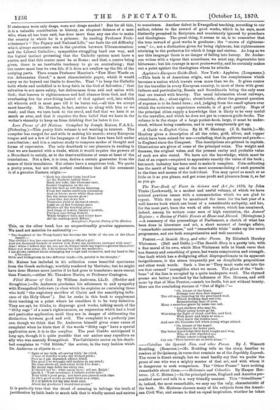Love Poems of All Nations. Compiled by Joseph Kaines, F.A.S.L.
(Pickering.)—This pretty little volume is not wanting in interest. The compiler has ranged far and wide in making his search; every European tongue and not a few of the languages of the East have been laid under contribution ; and it is a curious study to compare modes of thought and forma of expression. The only drawback to our pleasure in reading is that we are haunted with a doubt, which it would require the powers of a Mezzofanti to satisfy, as to the trustworthiness of some at least of the translations. Not a few, it is true, derive a certain guarantee from the names of their translators. Bat others have a suspicious look. We quote a pretty poem, but not with perfect confidence that all the ornament is of a genuine Eastern origin :— " Mark her slender form bend low As the Zephyrs lightly blow ; Mark her robe, like blossoms rare, Scatter fragrance on the air ; See her face as soft moon beaming, From her smiles ambrosia streaming,
And on brows more white than snow See the raven tresses glow ! Lotus-like, her dewy feet Treasures yield of nectared sweet ; Light as on her footsteps pass, Blushes all the bending grass ; And rings of jewels, beauty's powers, Freshen into living flowers, While brighter tints and rosier hues All the =fling earth diffuse."
Broughton's Popular Poetry of the Bindoos.
This, on the other hand, has an unquestionably genuine appearance. We need not mention its nationality :—
"The daughter of the Wang family has become the bride of the son of the Chow family,—
The civilian's boy has espoused the military officer's girl!
And ten thousand bushels of sorrow lock down my eyebrows overcast with care! Alas! when I reflect that we, too, are in distant lands my regret is greater than ever! Since you went away, Sir, I do nothing but knit my eyebrows;
I am grown careless about arranging my rouge and cosmetics, and my head is like a broom— Bride and bridegroom in two different lands—Oh, painful is the thought;"
Mr. Kaines has included in his collection some beautiful specimens from the Greek anthology, worthily rendered by Merivale ; but he might have done Horace more justice if he had gone to translators more recent than Francis,—either Mr. Theodore Martin, or Professor Conington.






























 Previous page
Previous page